If there’s one thing that we love apart from the purring noise of out felines, that’d be the call of birds. While it may be a pleasant sound for its parent, their neighbors might not find it to be so – and this could bring trouble for bird owners who live in condominiums or apartments. Therefore, you may choose one of the quieter bird species that’s most likely to live well with you in your small space.
There are plenty of bird species who will complement with your lifestyle and home. You need to look for them carefully to find the perfect ones. However, do take note that there is no general rule that states that smaller birds won’t be quieter or larger birds would be noisier. So what to do? Well, in short, you need to regard their species.
Scroll down and take a look at these species of birds. They are relatively quieter and would make ideal pets:
Parakeets
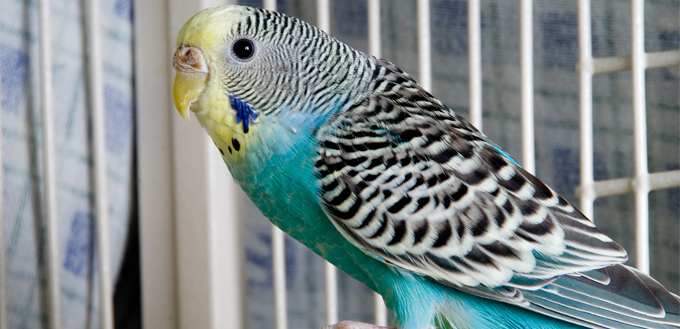
If you’re fond of parrots but prefer a smaller species of bird, then a Parakeet may be the bird you’re looking for. They are sweet and cheerful little social birds, who enjoy interacting with their human companions. They belong to the parrot family but are small versions of them. Although you can teach them to talk, they cannot screech at a high volume as large parrots do. Therefore, they make an excellent choice for bird owners who prefer a quieter pet. Their social personality needs attention now and then. So, make sure you have enough time and energy to devote to your little birdy.
Check out our article on the Best Parakeet Toys.
- Care and Feeding:
Just because they are small, it doesn’t mean that they don’t need much attention. These exotic species need extra attention if you are petting one of them. Their surroundings are crucial to their wellbeing. They need enough room to climb and fly around horizontally, so make sure you buy an essential bird cage you get. Bear it in mind that metals like brass and zinc are toxic to them. Their cage needs to be made of stainless-steel with horizontal bars. A toy or two with mirrors and bells would keep them happy and content throughout the day. Needless to mention about their high-quality feed will ensure a long and healthy life for them.
Parrotlets
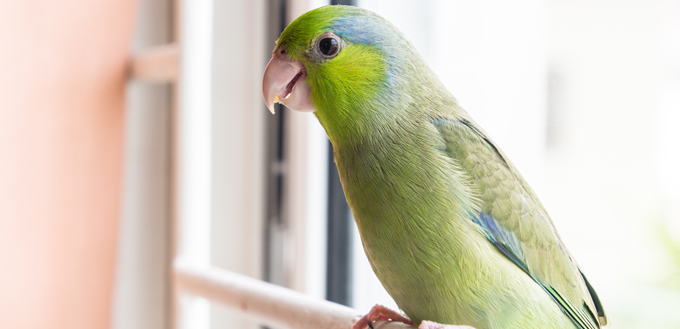
They are parrots but a tiny version of them. They lack the ability to squeal or scream like other hookbills. They chatter ad chirp very softly, which is hardly even disturbing for anyone, even with the most sensitive ears. Parrotlets are incredibly active and wild birds for which you need to keep them stimulated at all times with plenty of toys and play space.
Generally, they are feisty, willful and affectionate too. Their ability to bond closely makes them great human companions but should be kept separate from other species. However, if you leave them alone for too long, they might lose their companionability, which is indeed not a positive aspect. They are great mimickers but are not great talkers, which makes them an ideal quiet pet, so your neighbors won’t feel much disturbed. You can still make them learn a few words and try your luck!
- Care and Feed:
Of course, they are small and cute, but they still need a big cage. Usually, we’d advise you to get a cage with no less than ¼-inch bar spacing for their play space and to store a few of their toys. As for their food, parrotlets should have a pellet-based diet along with fresh vegetables and fruits. You could even dice up their fruit and break them into tiny pieces. Just make sure they consume the right food and nutrients. To find the best feeder for them, click here.
Cockatiels
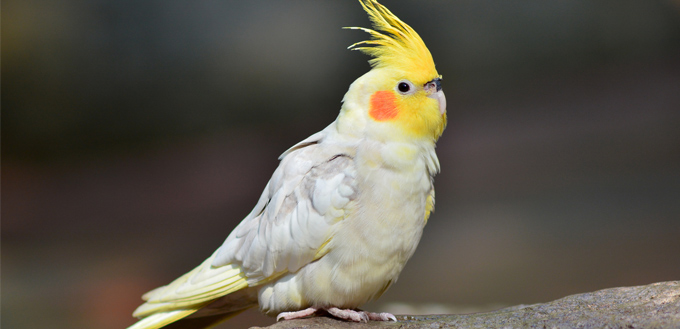
If you prefer a bit larger species than Parakeets, we’d say that a Cockatiel could make an ideal pet. And why not? They are beautiful and can be quite enthusiastic around their human companion. However, they are quieter than parrots and many other species. Cockatiels are commonly seen as pets, and their popularity is indeed well deserved. There’s a reason why they are so well-known – they are both bold and cuddly. Moreover, their fun and curious personality allow being trained to learn certain behavior. Light chirps and whistles from a cockatiel at the end of a tiring day could be very calm and relaxing.
- Care and Feed:
Although cockatiels are very playful and sociable, there are certain factors you need to consider when caring for them. If you already have a bird, you may need to think twice before bringing in a cockatiel or keep them in a separate cage. You can introduce them to other birds, but keeping them together in a separate cage is not recommended.
Their diet consists mostly of pellets. Nutritionists have divided their diet to be 70% of pellets and 30% of fresh vegetables and fruits (in a small amount). Cockatiels have a high requirement for vitamin-A, but be sure to steer away from anything with salt, as they can be toxic for them. Last but not least, remember to change their leftovers in the cage from becoming stale. If swallowed, it can be poisonous.
Finches and Canaries
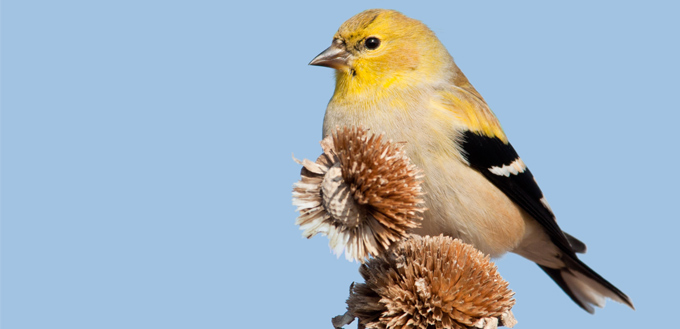
These tiny birds could be the cutest addition to a corner of your house in a cage. They are tiny, and their voices are more diminutive, which makes them a tremendous silent pet bird for bird lovers. They are fantastic companions for children without the need for extensive handling. Plus, they don’t even inflict painful bites as some parrots do.
However, they are a little fragile. If you make a lot of noises or move their cage now and then, they tend to get nervous, causing them stress. Try to bond with them by speaking in a calm and soothing voice. Once they get used to your voice, they will try to associate it with positive things such as fresh foods. It may take a little while for them to get used to the touch of your hands for which you need to sort out things in their cage without much of a flap. They will patiently listen to you when you speak, putting their head on one side and responding with slight chirps and whistles. Don’t expect them to mimic or talk, as they don’t have the power to do that.
- Care and Feed:
As a bonus, their tiny size helps to keep the space requirements to a minimum. All they need is a well-designed and regularly cleaned cage in a cozy room. Additionally, they also need clean and fresh water for drinking as well as for bathing.
Their diet supplements require to be well-balanced with quite a variety. Part of their food is seeds, and they tend to scatter around their seed, so a sufficient vacuum is highly needed. Build a stress-free (no long all-night lights, no predatory dogs or cats or children prodding things into the cage) for your little birdy, and they will be an excellent company for you.
Senegal Parrots
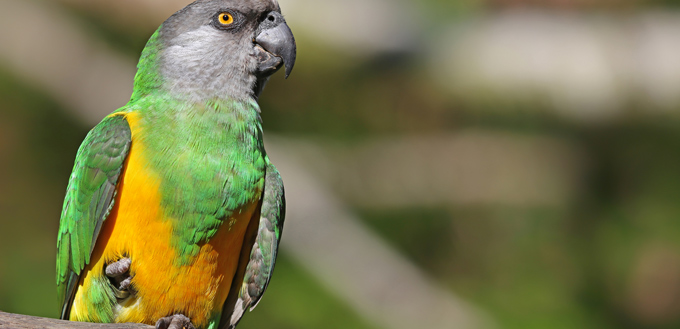
Only about 10 inches long, Senegal Parrots are medium-sized birds known to be the quietest species among all parrot species. They are, after all, parrots and would certainly vocalize and try to talk if you teach them right. However, they are not likely to screech and scream like large sized parrots.
Senegal parrots are sweet and cheerful, and all they want is to sit on your shoulder all day long. As beautiful as they are, their great personality is something that immediately clicks. They enjoy their human companion and become attached to them so much that they don’t need another Senegal to keep themselves stimulated. They will appreciate you for all the love, affection and attention you give them and will also adore you in return. The great news is that they live over 30 years, which makes them a good lifetime companion for those who are thinking long-term.
- Care and Feed:
For Senegal parrots, bird toys are a must. On top of that, they love chewing and biting on blocks of softwood. They are also fond of rope toys but watch out for long threads that can catch around their neck or on their foot. And those acrylic toys with bells attached to it works wonderfully and thankfully lasts longer than destructible materials.
Senegal parrots aren’t picky eater in general and will delight in almost any kind of food and nourishing food. Keep in mind that Senegal parrots tend to become overweight. To avoid that from happening, they will need enough exercise and an excellent diet. They are active birds by nature and will not have any issues when trying to exercise. Typically, a pelleted based food is a perfect start of their meals, which later you can supplement with fresh vegetables and fruits.
Tips to Keep Your Pet Birds Quieter than Usual:
Although we’ve listed all the quieter birds there is, sometimes, they might create some noises at the wrong time. They too, after all, get into fights or excited for no reason at times. So, what do you think you should do to keep your pet bird quiet when you want them to? Here are some ways we’ve listed:
- Put a dark colored cotton cloth over the birdcage. This is to block the light out and put your birdy back to sleep.
- If your birdy is small, try to take them and cuddle them under your shirt. It will provide warmth and darkness, which will eventually calm him or her.
- Speak calmly to your bird. They will sometimes stop chirping and whistling only to hear the sounds that you’re making.
- Your little birdy might be nervous. Slower your movements and stop any other noises around. A stressed bird can sometimes make noises.
- Check to see if your birdy is responding to any outside noises made by other birds, animals or machines. If that happens, you’ll need to move your bird’s cage to somewhere quieter.
- Once they become quiet, reward them! Give them some plain slices of apple or popcorn, which by the way, are wonderful treats for birdies.
No Bird is Silent
Be sure that no bird is entirely silent. It just is not in their nature to be silent; birds are very sociable creatures, and their vocalizations are just the way they love to behave. However, if your quiet bird is chirping a little too much, the chances are that they might be sick. To get rid of any confusion, consult the vet. Your little birdy deserves the best of the care!
What are some of your favorite bird species and why? Familiarize us with some more of the bird species. We’d love to know!





